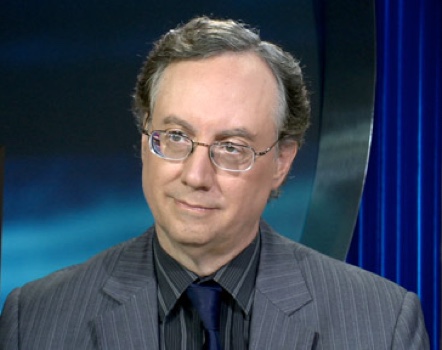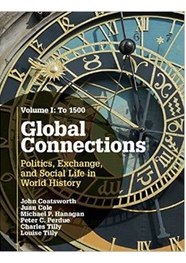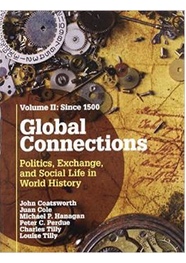What I'm Reading: An Interview with Juan Cole

Juan Cole is Director of the Center for Middle Eastern and North African Studies at the University of Michigan. He maintains a blog on US foreign policy and progressive politics, Informed Comment. His most recent book is Global Connections, volumes One and Two, a world history textbook co-authored with John Coatsworth , Michael Hanagan, Peter C. Perdue, Charles Tilly, and Louise A. Tilly.
What books are you reading now?
I've just started Elizabeth Kolbert's The Sixth Extinction-- which is history on a truly epic time scale.
What is your favorite history book?
It is very hard to choose, of course, just one. But if pressed I suppose I would say E.P. Thompson's Witness against the Beast: William Blake and the Moral Law. His teasing out of the context of Blake's unorthodox religious ideas in the late eighteenth and early nineteenth century context is masterful.  Why did you choose history as your career?
Why did you choose history as your career?
It was the Lebanese Civil War of the 1970s and 1980s that led me into the discipline. I had majored in the History of Religions at Northwestern as an undergraduate, where there was an influence of the University of Chicago's phenomenology of religion approach. It was all about texts and high culture. I tried to do a Master of Arts degree in World Religions at the American University of Beirut, beginning 1975. But the war turned deadly that fall and I had to leave, ultimately ending up at the American University in Cairo instead. It had no religion department (the rumor was that the al-Azhar Seminary, which is kind of the Vatican of the Sunni Muslim world) pressured the government not to allow departments of Comparative Religion because they disliked the scientific study of religion. I do not know if this is true.) I did an MA at the Center for Arabic Studies and turned to history under the influence of Marsden Jones and Arnold Green. I found history much more textured, gritty and capacious than the phenomenology of religion. It was sort of like History was a real human being and phenomenology of religion was a sculpted ideal bust.
Which historical time period is your favorite?
I suppose I've spent more time in the eighteenth and the nineteenth centuries than any other. It isn't so much that it is my favorite time period but that the eighteenth century in the Middle East and South Asia was underwritten by professional historians when I was young, and yet it is recent enough that a great deal of documentary material survives. So it was a time period that allowed a young historian to do something original and make a mark. The nineteenth century ended 52 years before I was born, so it is in some ways recent for me, but very different technologically and culturally, and I suppose that is an appeal.
Who was you favorite history teacher?
I had the privilege to study withNikki Keddie at UCLA, the major figure in Iranian history in her generation. Her social insight, awareness of social theory, and historical imagination benefited me enormously. She probably had the biggest intellectual impact on me of all the people I studied with.  If you could have dinner with any three historians (dead or alive), who would you choose and why?
If you could have dinner with any three historians (dead or alive), who would you choose and why?
Edward.P. Thompson, Christopher Bayly, and Natalie Zemon Davis.
What was your favorite historic site trip?
Oh, Istanbul is my favorite place to go for historical monuments. Since it wasn't violently conquered after 1453, so many great buildings survived intact, unlike in Baghdad. Its position on the Bosphorus and the Golden Horne is also breathtaking.
Your latest book is a two-volume textbook on world history. Why should a teacher use this book for their students?
It is one of the first world history textbooks truly to address the whole history of globalization, including communications revolutions through history. It also combines global history with social history, telling the stories of the little people and not just the high political class, which necessitating bringing in sociology and economics.
How long did it take planning to write this?
The textbook was a massive endeavor of course, and began being planned in the late 1990s.
What was it like writing a book that is it first combining world history and social? How do you know these other authors?
The authors all knew their way around social history. One of them, Charles Tilly, was one of the founders of the discipline. So it was something that came natural to us, since it is how we see the world.
Do you plan on writing any future books like this?
Who knows? Doing it made me thing a lot about writing history over the longue duree and also cross-cultural phenomena. I'll no doubt take those concerns into future work.
What are you hopes for world and social history?
Since the heyday of social history in the 1970s and 1980s, many other approaches have swept through History Departments, including Postmodernism. Perhaps at the moment we are in a period that Peter Novick characterized in his That Noble Dream as "No king in Israel," i.e. no paradigm or approach into which there is a great deal of buy-in across historical specializations. I think social history and world history have settled in as possible approaches in most departments, co-existing with other methodologies and that is healthy.
Do you own any rare history or collectible books? Do you collect artifacts related to history?
I collect travelogues by Europeans in the Middle East. For all their flaws, they are often full of telling details about daily life that you cannot get from archival documents. Of course they have to be treated with skepticism, but then that is what we historians do.
Which history museums are your favorites?
I love local history and city history museums. I think the National Museum of Singapore is very well done. Likewise the Museum of Catalonian History in Barcelona. Of course, I love the big national museums like the British Museum and the National Museum of China (on Tienenmen Square) as well.
What would be your advice for history majors looking to make history as a career?
A career in an academic history department just can't be guaranteed nowadays. But get into a good History Ph.D. program and write an original dissertation that solves some problem people are arguing about, and you have a good shot. Historians can also do other things-- government offices sometimes want a historian, and it is a good background for journalism. The very successful blog, Talking Points Memo, was founded by historian Josh Marshall. The important thing is to follow your heart and mind.